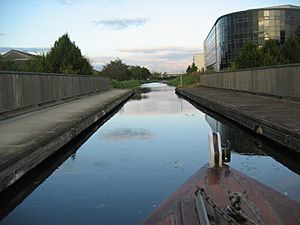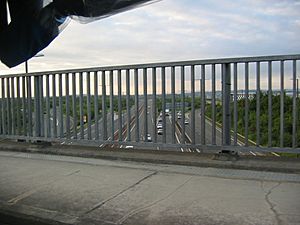Scott Russell Aqueduct facts for kids
Quick facts for kids Scott Russell Aqueduct |
|
|---|---|

Scott Russell Aqueduct
|
|
| Coordinates | 55°55′18″N 3°18′25″W / 55.9218°N 3.3070°W |
| OS grid reference | |
| Carries | Union Canal |
| Crosses | A720 bypass |
| Locale | Edinburgh |
| Characteristics | |
| Total length | 330 feet (100.6 m) |
| Width | 12.8 feet (3.9 m) |
| Traversable? | No |
| Towpaths | N Side |
The Scott Russell Aqueduct is a special bridge that carries the Union Canal over a big road called the Edinburgh City Bypass. You can find it west of Edinburgh, in Scotland. An aqueduct is like a water bridge that lets boats travel over land or other roads.
Contents
What is the Scott Russell Aqueduct?
This aqueduct is a key part of the Union Canal. It helps boats cross the busy Edinburgh City Bypass. It's named after a famous Scottish engineer.
When Was the Aqueduct Built?
The Scott Russell Aqueduct opened in May 1987. It was built to carry the canal over the new Edinburgh City Bypass. Building it showed great belief in the future of the canal.
Why Was This Aqueduct Important?
At one point, some people thought about not building this aqueduct. They considered making a marina (a place for boats) instead. But thankfully, they decided to build the aqueduct. This decision was very important for the canal's future. It led to the Millennium Link project. This project connected the Union Canal with the Forth and Clyde Canal. This created a waterway link from one coast of Scotland to the other.
Who Was John Scott Russell?
The aqueduct was named after John Scott Russell on July 12, 1995. He was a Scottish naval engineer. He made an amazing discovery near Bridge 11 on the Union Canal in 1834.
What Did John Scott Russell Discover?
Russell discovered something called a soliton. This is also known as a solitary wave. He saw a boat stop moving, but its bow wave kept going forward. It traveled at about 8 or 9 miles per hour. He called this the "wave of translation." This discovery was very important for understanding waves.
How is the Aqueduct Designed?
The Scott Russell Aqueduct is wide enough for one canal boat. It crosses the Bypass at a slight angle. The aqueduct has five sections, or spans. These spans are held up by three piers (support columns).
 | Bayard Rustin |
 | Jeannette Carter |
 | Jeremiah A. Brown |


